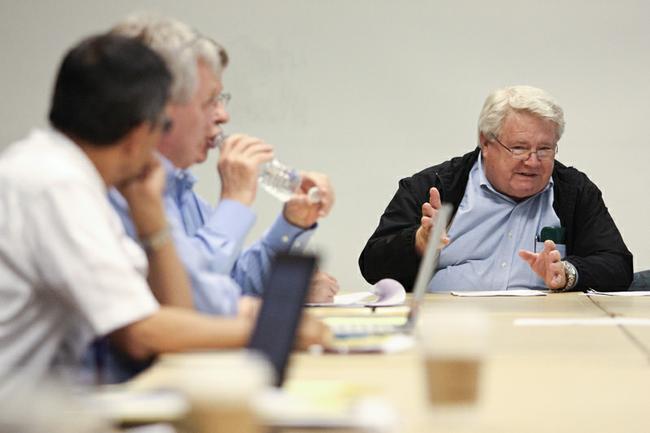The talk was about wearing bowties and sundresses to football games when MU first announced its move to the Southeastern Conference. Now, the conversation surrounding MU’s move to the SEC is all academics, at least in Thursday’s Faculty Council meeting.
MU is fifth in total enrollment in the SEC, sixth in average SAT scores and fourth in athletic graduation success rate, which puts the school right in the midst of the other conference universities, NCAA faculty representative Lori Franz said.
“We’re very much at home in the SEC,” Franz said. “This is a conference that really wants to have a different image than they have in the past.”
The SEC had problems roughly 10 years ago when conference had nine major violation cases, Franz said.
“The chancellors and the board were tired of it and hired Mike Slive as a commissioner,” she said.
Slive sat down with MU coaches to discuss what the SEC would be like. Joe Scogin, the associate athletic director for academic services, was also at the meeting.
“Mike Slive said, ‘Working in the SEC is a privilege…if you knowingly break NCAA or SEC rules, I hope you get fired. You don’t belong in the SEC,’” Scogin said. “Then he shut the door and the meeting was over.”
All the new rules and new requirements make for changes all over, including in academia. One of them involves the class attendance policy.
Overall, MU has had high Academic Progress Rates among its student-athletes, Franz said.
“(MU) makes up that policy, but (the SEC says) there has to be suspension from competition involved if there is a violation of that policy,” she said.
Certain student-athletes are “targeted” because they are considered at-risk, and faculty members are relied on to notice if they are showing up to class. Currently, reporting attendance depends on the individual faculty member. The details for attendance have not been finalized yet, Franz said.
“You don’t want to put (the student-athletes) in a situation that’s incredibly different from other students,” she said.
Faculty Council member Gordon Christensen asked if the attendance policy will lead to separate treatment for student-athletes. Student-athletes are held to different standards than other students already, said Executive Associate Athletic Director Sarah Reesman.
“We try to make the experience the same,” Reesman said. “These have come about because of a desire to make sure (student-athletes) aren’t coming here just to be athletes.”
Transfer regulations are also stricter in the SEC than they were in the Big 12. The SEC lists both English and College Algebra as necessary classes, which MU already requires, but it also requires they must be taken in a traditional classroom, Scogin said.
“In the Big 12, it didn’t matter how English and math courses were taught,” he said. “The SEC limits that because of some of the challenges out there with institutions that (do not) have control over their non-traditional courses.”
MU is now a part of the SEC Academic Consortium, which was created “to advance academic excellence through collaboration of SEC universities.”
In addition to the consortium, there are also SEC-oriented meetings. These meetings were modeled after the Big 10 Committee on Institutional Cooperation’s approach to academic and student exchanges, Franz said.
“I know Brady (Deaton) worked very hard to get it established in the Big 12, but it wasn’t the right time,” she said. “Now we have the kind of environment we like academically.”
In continuing its support of academics, the SEC pays attention to faculty as well. They have the Southeastern Conference Faculty Achievement Awards, which is a $5,000 award for outstanding faculty.
Faculty Council Chairman Harry Tyrer noted that the SEC is the only Division I conference currently recognizing faculty for their successes unrelated to athletics. The awardee has not been chosen at MU yet, but it is a huge honor, Franz said.
“I think the SEC has a very strong interest in the university as a whole,” she said.








